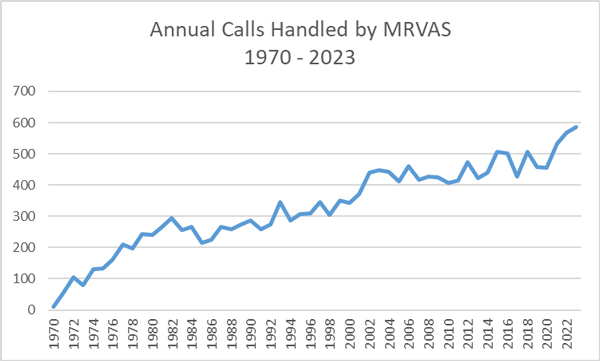The Mad River Valley Ambulance Service responded to 587 calls in 2023, the highest number in its 53-year history. MRVAS is now one of only two all-volunteer EMS agencies remaining in Vermont. Last year, its 75 active members donated more than 29,000 hours dispatching calls, responding to medical emergencies, performing rescues, attending training, and serving in various capacities to administer and operate the service.
Over the past 10 years, MRVAS invested $1.2 million to replace three ambulances and a rescue rig, replace three Lifepak 15 cardiac monitors/defibrillators and to maintain its facilities. Insurance reimbursements provided less than half of this required funding. Valley residents, visitors and businesses contributed $731,000 and Valley towns donated $150,000.
MRVAS would not have been able to survive without this support. The MRVAS board recently approved a capital expenditure plan that calls for $1.4 million in capital expenditures for the next 10-year cycle of replacements,” said MRVAS spokesperson Mark Giometti
“Significant funding challenges lie ahead as insurance reimbursements continue to lag behind the rising cost of EMS care. For a basic emergency call, Medicare and Medicaid which represented 58% of last year’s calls, reimbursed MRVAS approximately $650 per call. In 2023, MRVAS’s per call costs were approximately $785 leaving a deficit of $135. Reimbursement rates from private insurers are slightly higher, but not sufficient to close the gap. If the value of volunteer time were included, costs would rise to $2,270 per call,” he added.

MRVAS does not pursue aggressive collection practices against non-subscribing patients.
“The squad would never want someone in need to hesitate to call 911,” Giometti clarified.
Last year MRVAS responded to 217 calls to evaluate patients, provide medical assistance, support our fire departments, respond to motor vehicle accidents, etc. where no patient transport was required. In most cases, government and private insurers do not allow for reimbursement of “no transports.” These calls are a critical part of the MRVAS mission and consume resources but generate no offsetting revenue, he said.
“MRVAS has been uniquely blessed by the generosity of its donors and spirit of volunteerism of members past and present. But going forward a more sustainable funding mechanism must be put in place. The MRVAS board looks forward to engaging with Valley stakeholders to ensure MRVAS can continue its mission of providing the highest quality of emergency medical services,” he concluded.














